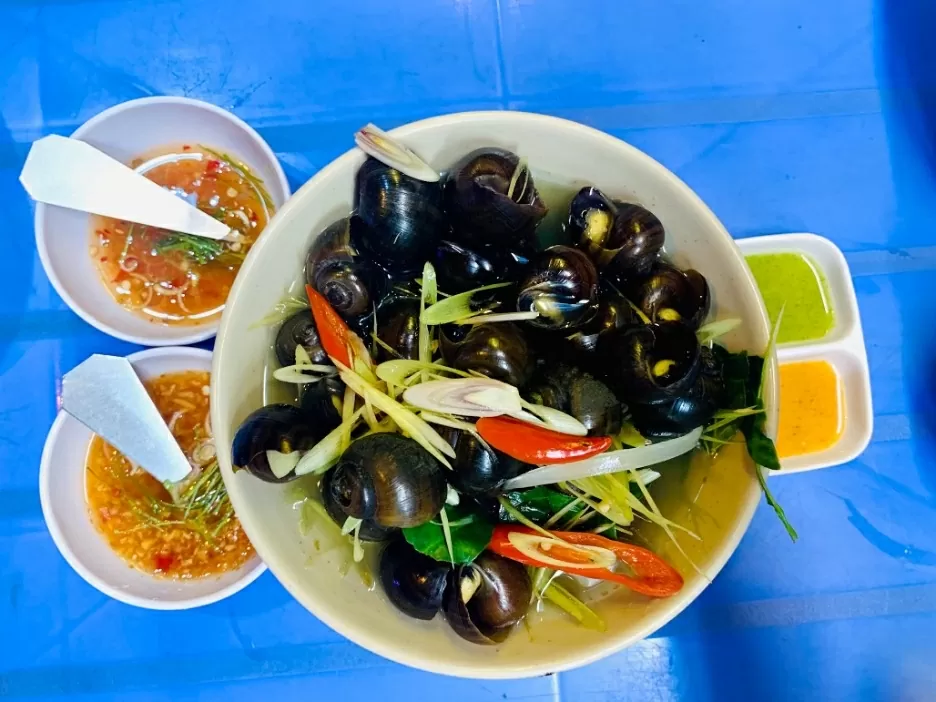Snails are a rich source of protein, but improper consumption can lead to bacterial infections and food poisoning.
 |
| Steamed snails with lime leaves are a popular dish. (Photo: TC) |
Snails are a favorite dish in many parts of the world , especially in Vietnam and France. However, if not prepared and cooked properly, snails can be dangerous to health, leading to bacterial infections, parasitic infections, or food poisoning. To ensure safety, you need to pay attention to the following:
1. Don't forget to give the snails the mud.
According to Mashed , snails live in muddy environments, typically feeding on various plants, soil, and even decaying organic matter. If not expelled before cooking, snails can contain toxins, bacteria, or pesticides. These contaminants can leach into the boiling water, cling to the snail meat, and harm health.
The proper way to flush out mud from snails: Place the snails in a covered, well-ventilated container of water, and do not feed them for 24-72 hours to allow them to expel all the dirt from their bodies. Some people recommend feeding the snails lettuce or rice flour to cleanse their intestines. Afterwards, rinse the snails several times with clean water, scrubbing their shells to remove any remaining dirt.
2. Do not boil snails at low temperatures.
Snails can harbor parasites such as liver flukes, meningococcal worms, and harmful bacteria. If not thoroughly cooked, these pathogens can survive and enter the human body.
How to boil snails safely:
- Boil at high temperature: Boil snails at 100°C for at least 10-15 minutes to completely kill bacteria and parasites.
- Remove floating snails: If any snails float to the surface of the water while boiling, discard them as they may be dead or infected.
- Check for doneness: Cooked snail meat should be firm and no longer slimy.
3. Don't eat too many snails.
Snails are a rich source of protein, iron, and omega-3 fatty acids, but they also contain purines, a compound that can increase uric acid levels in the blood, leading to gout and kidney stones if consumed in excess. Therefore, you should:
- Limit your consumption: You shouldn't eat snails more than 1-2 times a week, especially if you are at risk of gout.
- Combine with green vegetables: Eating snails with foods rich in vitamin C (such as bell peppers, spinach, and tomatoes) helps reduce uric acid.
- Avoid drinking alcohol when eating snails: Alcohol increases the risk of uric acid buildup, which can easily lead to gout.
Nutritional composition of snails
Snails are a highly nutritious food, providing a rich source of protein, vitamins, and minerals, while being low in fat:
Protein and fat: According to the U.S. Department of Agriculture , 100g of snails contains approximately 12-16g of protein, making it a high-quality source of protein. The fat content is low, only 1-2g per 100g of snails, mainly consisting of unsaturated fats that are beneficial for cardiovascular health.
Vitamins: Snails are rich in vitamin B12, essential for red blood cell production and nerve function. Additionally, they contain vitamin A, which supports vision and the immune system, and vitamin E, which helps protect cells from damage caused by free radicals.
Minerals: Snails are a good source of iron (which boosts hemoglobin), magnesium (important for muscles and nerves), zinc (which strengthens the immune system), and selenium (an antioxidant). Additionally, snails contain calcium, which supports strong bones.
Source





![[Photo] Prime Minister Pham Minh Chinh presides over a meeting on private sector economic development.](/_next/image?url=https%3A%2F%2Fvphoto.vietnam.vn%2Fthumb%2F1200x675%2Fvietnam%2Fresource%2FIMAGE%2F2025%2F12%2F20%2F1766237501876_thiet-ke-chua-co-ten-40-png.webp&w=3840&q=75)































































































Comment (0)